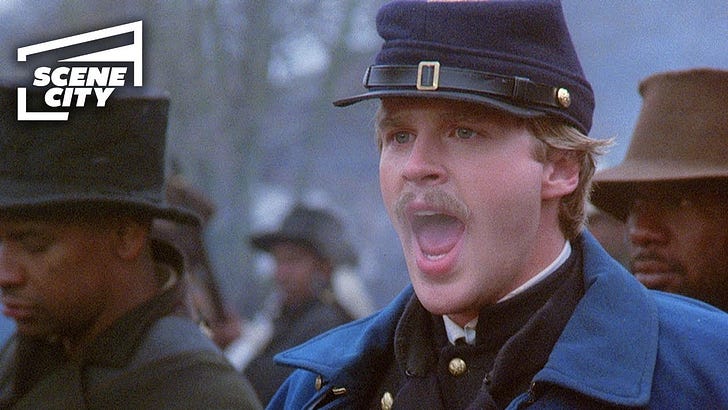I am still sometimes surprised by the ways in which the movie Glory has shaped my understanding of Robert Gould Shaw and the men in the 54th Massachusetts Volunteer Infantry.
Consider this scene from the movie in which Shaw chastises Major Forbes for his failure to properly train the men to discharge their weapons in an efficient manner.
It’s one of many scenes that reinforces the narrative arc of the movie in which Shaw learns to identify and bond with his Black soldiers. They are largely a Hollywood invention. No, Shaw didn’t tear up his pay voucher in solidarity. No, Shaw did not announce the Confederacy’s policy that any Black soldier captured in battle would be sold into slavery.
What I am struck by as I work on the chapter in my biography of Shaw, that is focused on the regiment’s training at Camp Meigs in Readville, is how little time he spent with the regiment during this period.
The 54th spent roughly 80 days in training at Readville before it shipped out from Boston at the end of May 1863. For the first few weeks Shaw remained in Boston working with Governor John Andrew to find new recruits. This was no easy task given the necessity of recruiting out of state to meet the necessary quota of men needed to fill out a regiment.
Shaw also worked on finding reliable junior grade officers for his regiment. Not surprisingly, he was less concerned about their views on slavery and race than he was about their military experience.
What stands out in his correspondence between the end of February and the end of May is how little he was involved in the actual training of his men. In fact, I am unable to find a single reference to Shaw working directly with the recruits or in tandem with other officers. That’s probably not too surprising. Company commanders would have taken a more direct role in the training of the men.
In addition to spending time with Andrew at the beginning of the regiment’s training, Shaw made regular trips to speak to private groups as a way to build popular support for the recruitment of Black soldiers. Paper work and his correspondence also occupied a substantial amount of time.
More importantly, Shaw married Annie Kneeland Haggerty on May 2, 1863. He enjoyed a brief honeymoon in Lenox, MA with his new bride until around May 10, but this means that he was absent from the regiment at a critical time with just a few weeks before its departure to South Carolina.
This suggests to me that Shaw knew very little about the Black men who joined the 54th Massachusetts. Shaw’s correspondence makes clear that he was pleased to receive encouragement and approval of his decision to take command of the first Black regiment raised in the North. But it also means that Shaw understood very little about how the racism and discrimination these men faced in their respective communities shaped the way they viewed the war, their hopes for the future, and the motivations behind their decisions to volunteer to serve.
In some ways this is consistent with his experience in the Second Massachusetts. I can’t recall a single reference in his correspondence that delves into the rank and file on an issue other than Shaw’s incessant complaining about the lack of discipline. Personal references in camp were confined to his fellow officers. Again, this also should come as no surprise.
I hope to explore this in some detail because it stands in sharp contrast to the way in which the relationship between Shaw and his men has been remembered and commemorated beginning with General Rufus Saxton’s attempt to convince the men in the 54th to donate their pay to help dedicate a monument to Shaw within weeks of his death right down to Hollywood’s interpretation in Glory.





The relationship of Shaw to his men seems to stand in apparent contrast to that of Thomas Wentworth Higginson. As you know, Higginson came to write a series of sympathetic essays about the black soldiers in his regiment, which he later gathered into a book. I wonder if the example of Higginson, who remained a significant figure until his death in 1911, influenced how Shaw was remembered?
I suspect your assessment of Shaw’s relationship with his soldiers is correct, especially when it come to oversight of or participation in training. And, I doubt that it was a great deal different from the relationship other Colonels had with their regiments in the United States Army of the period. When it came to training the individual soldier or even the company that was the job of the sergeant or lieutenant, or captain.